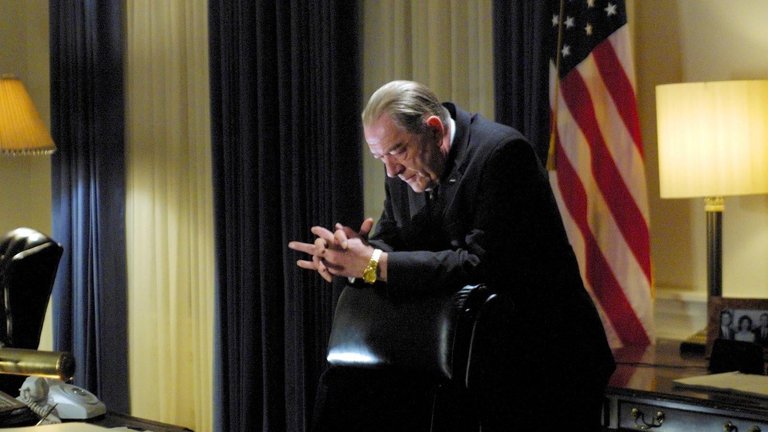Film/Television Review: Path to War (2002)

"Those who cannot learn from history are bound to repeat it" - a sentiment that seems all too applicable to the current state of affairs in the United States, at least when judging by the events of the past quarter-century or so. While many can be held responsible for this sorry state, one individual who is certainly not to blame is the late John Frankenheimer, the director whose final work, the 2002 historical cable film Path to War, proved to be eerily prophetic despite dealing with the past.
Path to War offers a comprehensive and compelling account of the events leading up to the United States' escalation of the Vietnam War under the presidency of Lyndon B. Johnson (played by Michael Gambon). The plot begins in January 1965 during the Inaugural Ball, when Johnson, after securing one of the most convincing victories at presidential elections, feel certain of the mandate to start comprehensive set of far-reaching economic and social reforms known as “Great Society”. His attention, however, slowly begins to be taken by crisis in South Vietnam, an important US ally which is threatened by Communist North. General Wheeler (played by Frederic Forrest) argues for deployment of combat troops and escalation of conflict through air campaign against North Vietnam, which is the stance ultimately shared by William McNamarra (played by Alec Baldwin), nerdish Defense Secretary inherited from Kennedy administration and often viewed as the most capable member of administration. Johnson ultimately accepts this view, although would later confer with Clark Clifford (played by Donald Sutherland), advisor who had the opposite opinion and argued for de-escalation and diplomatic solution. As time goes by, increasing numbers of troops sent and bombs dropped doesn’t appear to change situation on the ground, with increasing toll in American lives and billions of dollars rerouted from “Great Society” into unpopular war endangering not only Johnson’s re-election chances but his historical legacy.
Path to War was produced by HBO, a cable network for which Frankenheimer had made a series of films exploring various chapters of U.S. history. This particular project, however, was deeply personal for the director, as it dealt with the most important events of his own directorial heyday in the 1960s. Frankenheimer, like many of his Hollywood contemporaries, was a left-leaning liberal and a staunch supporter of President Kennedy and his brother, Robert, the latter being his personal friend. Like many from those circles, he saw Johnson as betrayer as Kennedys’ legacy and his presidency as start, if not the source, of everything wrong with America in subsequent decades. However, after extensive historical research for the film, Frankenheimer's perspective on Lyndon B. Johnson mellowed, and he portrayed the former president not as a monster, but as a flawed human being whose intentions may have been good, but whose decision-making abilities ultimately failed him.
Johnson’s character isplayed brilliantly by Michael Gambon, who transforms from a brash, self-confident politician at the height of his power to an insecure and indecisive leader forced to make a humiliating exit from office. Alec Baldwin delivers a standout performance as the nerdish but arrogant Defense Secretary Robert McNamara, who only begins to show emotions and doubts after witnessing the self-immolation of a peace activist. Donald Sutherland, meanwhile, provides a solid but less remarkable portrayal of Johnson's dovish advisor, Clark Clifford.
While Frankenheimer's direction of Path to War is not particularly spectacular, the film serves as a powerful production by presenting one of America's worst historical nightmares from the perspective of the people who were, in one way or another, responsible for it. The film's unfortunate timing, airing soon after the 9/11 attacks and during the chauvinistic hysteria that led to the U.S. invasion of Iraq, has only added to its relevance and poignancy. Many see the Iraq War as a repeat of the same mistakes that Johnson made three and a half decades earlier, a cautionary tale that Path to War so effectively captures.
Frankenheimer's final work stands as a sobering reminder of the consequences of ignoring the lessons of history, a warning that seems all too relevant in the current political climate. Path to War serves as a powerful and thought-provoking exploration of the perils of hubris, the fragility of power, and the enduring importance of learning from our mistakes.
RATING: 7/10 (+++)
Blog in Croatian https://draxblog.com
Blog in English https://draxreview.wordpress.com/
InLeo blog https://inleo.io/@drax.leo
Hiveonboard: https://hiveonboard.com?ref=drax
Rising Star game: https://www.risingstargame.com?referrer=drax
1Inch: https://1inch.exchange/#/r/0x83823d8CCB74F828148258BB4457642124b1328e
BTC donations: 1EWxiMiP6iiG9rger3NuUSd6HByaxQWafG
ETH donations: 0xB305F144323b99e6f8b1d66f5D7DE78B498C32A7